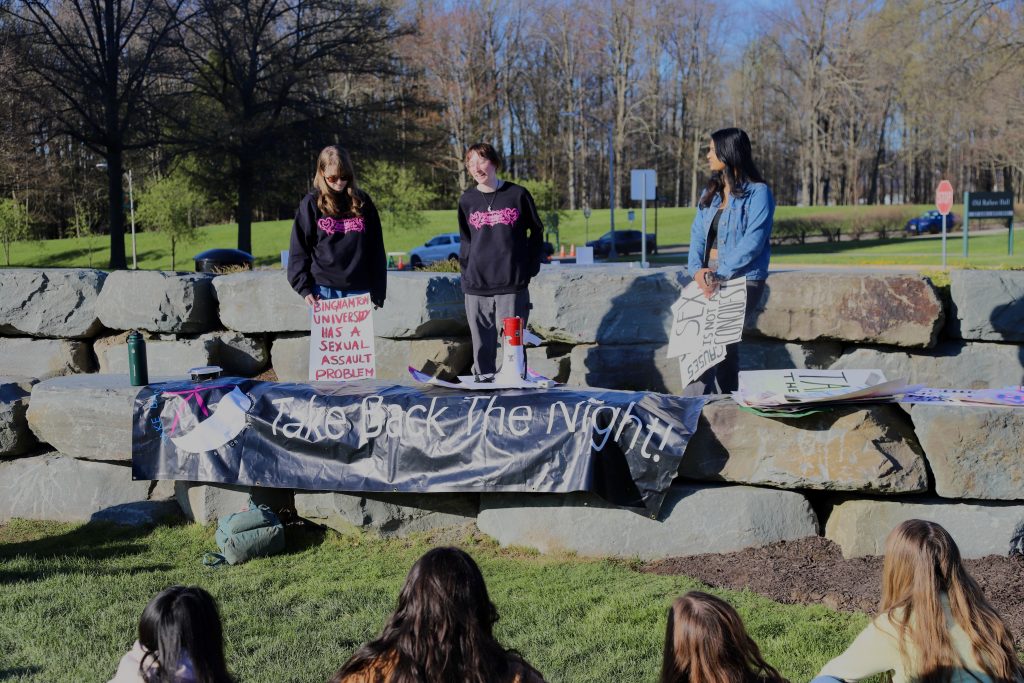The Feminist Collective, a student activist organization centered around intersectionality, anti-capitalism and abolitionism, organized its annual Take Back the Night rally this past Thursday.
With Sexual Assault Awareness Month coming to an end, students gathered on the Peace Quad with signs, standing in solidarity with survivors and calling out Binghamton University’s lax attitude toward sexual violence cases. It began with speeches addressing Take Back the Night’s history and the long-standing threat of sexual violence on college campuses, with the first speaker being Aleena Paulson, the organization’s president and a junior majoring in political science.
KT Fitzgerald, the collective’s senior advisor and a senior majoring in psychology, and Isabelle Beatus, the organization’s vice president and a senior double-majoring in political science and sociology, also addressed these topics while highlighting available resources for victims and those interested in actively combating rape culture.
In her opening speech, Paulson described the campus culture that permits sexual violence by accepting it as a part of the college experience. She emphasized the impact sexual violence has on its victims and the detriment it can put on a person’s ability to continue pursuing their education.
“It has become rather normalized within our campus culture to ignore sexual assault as a norm of getting a degree, rather than as an incredibly malicious and vile act that places victims at a disadvantage,” Paulson said.
The E-Board mentioned @shareyourstorybing — an Instagram account that began anonymously sharing survivor stories in June 2020. The account has a story highlight on its page highlighting allegations of negligence by University administration and police, and over 800 experiences of sexual violence have been shared. These testimonies speak to the disappointing way these prevalent issues are handled by the University, they say.
The University did not immediately respond to Pipe Dream’s request for comment.
Following the rally, the Feminist Collective held a Survivor Speak Out in the University Union Undergrounds.
Beginning in the 1970s, Take Back the Night rallies target violence against women, particularly cases of physical and sexual assault that often occur at night. Historically, the march’s purpose has been to create a space for women to reclaim their bodily autonomy and demand safety for themselves and others. Paulson joined marchers in demanding change at the University and on college campuses everywhere, and she expressed her belief that, by coming together, women can inspire change and promote liberation from historically upheld misogynistic and violent cultures.
Resources for survivors were promoted during the speeches, like the Violence Abuse and Rape Crisis Center (VARCC), a space located on the third floor of Old Johnson Hall that provides resources to those who have faced interpersonal violence, and the Crime Victims Assistant Center, a free off-campus resource open to any crime victims unaffiliated with BU.
According to Mia DeVito, the Feminist Collective’s secretary and a junior majoring in sociology, the organization strives to create a welcoming space for survivors and to connect them with resources geared toward support and advocacy. She emphasized the importance of increasing these resources’ availability to freshmen, describing the “Red Zone,” the period of time between orientation and winter break when students are statistically more vulnerable to sexual violence.
E-Board members also raised demands for divestment, as the Feminist Collective is a member of the Divest from Death Coalition, a group of student organizations urging the University to adopt principles of the global Boycott, Divestment, Sanctions movement. They highlighted the University’s partnerships with Israel and the defense industry as proof of the institution’s investment in mechanisms of violence, which they say negatively impacts both the campus and global communities.
“We demand the University divest from weapons manufacturing companies, defund the police and reallocate these funds to the VARCC, increase culturally competent mental health providers and generally more support services for survivors,” Beatus wrote in an email.
The rally concludes the week of programming dedicated to Take Back the Night, which includes events like Chalk the Walk and poster making. Organizers said they believe that engaging students in Take Back the Night programming, as well as other stands against sexual violence, has become increasingly difficult in recent years, and for future rallies, they are thinking of ways to expand its reach.
“This rally is how we show the student support for these demands and encourage University action,” Beatus wrote. “We hope that anyone who participates in the rally feels that solidarity and community, here on campus and internationally.”
Editor’s Note (5/1/24): This article has been edited to correct KT Fitzgerald’s major.



